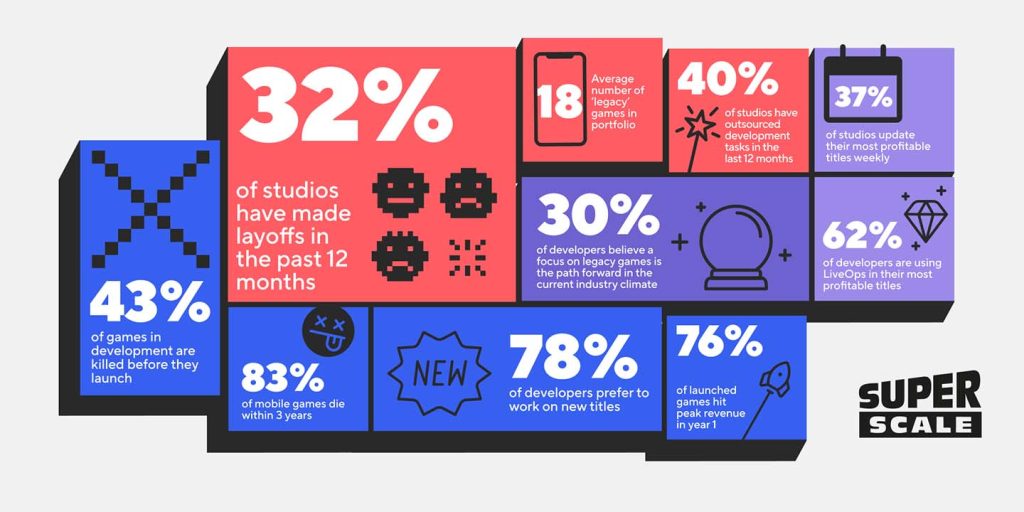LONDON, UK — SuperScale, the revenue growth engine for mobile games, has unveiled startling new research about the mortality rate of mobile games development. Based on data from its Good Games Don’t Die white paper, it reveals that a staggering 83% of launched games die within three years, and 43% of games are killed in development before they launch, clearly illustrating significant issues prevalent in contemporary mobile game development.
The new study draws on interviews conducted with 500 game developers across the UK and US, carried out by Atomik Research on behalf of SuperScale. The report reveals that regardless of this critical high failure rate, 78% of mobile game developers prefer to work on new titles, creating a catch-22 scenario for the $96.2 billion international mobile games industry. Trends like global recessionary pressures, the redundancy of 6,000+ developers in 2023, and a general downturn in investment throughout the sector are echoed in the report in which 32% of developers conducted layoffs, and nearly a quarter came close to shutting down the business.

The report’s findings also provide insights into the human impact of the high failure rate of mobile games, ranging from loss of motivation, risk aversion, and increased commercial focus. Creative unfulfillment from cancellations was reported by 30% of junior developers with less than one year of experience.
Given the endemic high failure rate in mobile gaming, the SuperScale white paper explores the untapped opportunities present in the ‘good games’ that died either in development or since launch. These “legacy games” are titles that no longer receive regular UA investments or live-op updates, or those that are declining in revenue. Based on the study data, a mobile gaming portfolio features an average of 18 legacy games, and these could hold significant commercial potential for developers and publishers. Across its 18 pages, the Good Games Don’t Die white paper unveils current trends in additional categories such as outsourcing, performance measurement, and monetization methods, which can be utilized to unlock the potential of good games which ‘died’.

SuperScale
Ivan Trancik, CEO and Founder of SuperScale, commented, “These are volatile times for the games industry. Many mobile game developers are finding it hard to remain profitable in the face of challenges such as ATT, heavy competition in a mature mobile market, and macroeconomic conditions like high inflation. 83% of games are flat-lining in the first three years is an eye-opening statistic, which indicates a new mindset is needed within the industry. Findings from the ‘Good Games Don’t Die’ white paper serve as a wake-up call for the industry, a source of inspiration with actionable data; equipping developers and publishers with insight on how revenue can be maximized across their portfolio – for games both new and old.”
He added, “The art and business of making games is often borne from a place of indescribable passion, and not always for pure commercial gain. We believe there is an opportunity for the entire games industry to reflect on the incredible gaming content that has already been created, and to take a second look at what can be done to inject new life into them.”
To hear more from Ivan, sign up here and catch the SuperScale team’s deep dive on how to fix underperforming mobile games.
Key findings:
- Recession in Gaming: 32% of studios have made layoffs in the past 12 months, 40% of studios have outsourced development tasks in the last 12 months. Collectible card games and hypercasual developers were affected most. Only a third of studios (32%) said they did not have to make layoffs, downsize or shut down.
- Monetizing mobile games: 62% of developers are using LiveOps in their most profitable titles, and 37% of studios update their most profitable titles weekly, with less than half pushing out monthly updates.
- Game failure and success: 43% of games in development are killed before they launch, 76% of launched games hit peak revenue within year one, 83% of mobile games die within three years and a mere 5% receive support beyond seven years.
- Passion versus profit: 78% of developers prefer to work on new titles, 30% of developers believe a focus on legacy games is the path forward in the current industry climate. 37% of respondents said that industry uncertainty is stopping them from developing new games, while 30% said the market is too difficult to succeed in right now, and 30% also believe their niche is too competitive.
The Good Games Don’t Die Report: Unlocking the Full Potential of Legacy Games is available to download here.








